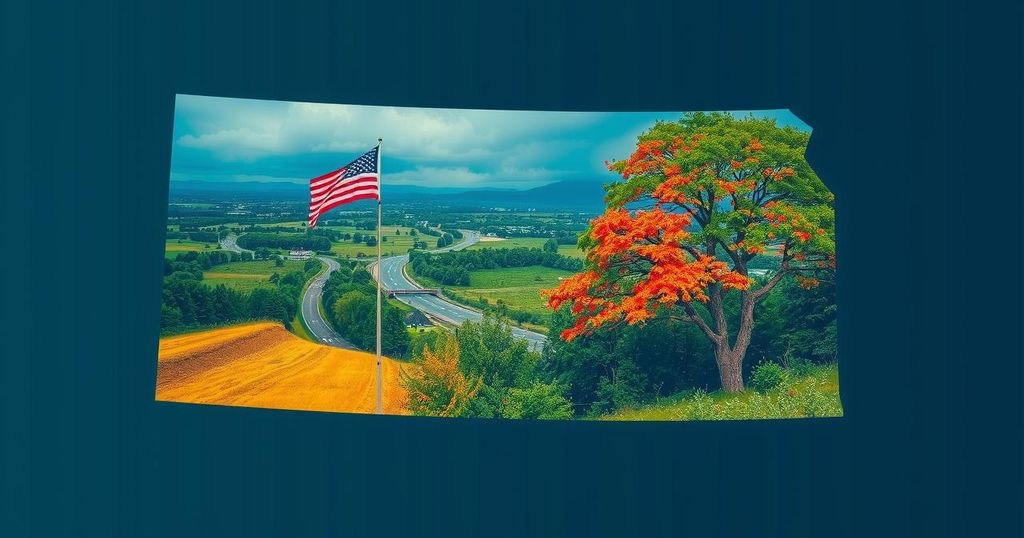Climate Change and the Presidential Election: An Urgent Moment for Kansas and the Planet
The article discusses the critical role of climate change in the upcoming presidential election in Kansas, emphasizing local impacts such as drought and the need for sustainable water sources. Experts warn of worsening weather patterns and ecological decline, urging voters to consider the far-reaching implications of their electoral choices for environmental policy and the future of the planet. The urgency for decisive action against climate change is underscored through scientific findings, pointing to the election as a turning point for both national and global ecological stability.
The consequences of climate change have become an increasingly urgent topic in the context of the upcoming presidential election, specifically in Kansas, where environmental issues intersect with political discourse. In southeast Kansas, the Little Caney River has dried up, prompting local communities to seek solutions like constructing a 14-mile pipeline for a dependable water supply. The election looms large for many residents, with divergent opinions on the future of the nation, the economy, and critical social issues, yet climate change remains a vital concern, albeit often overshadowed by more immediate topics. Experts warn that the country faces severe repercussions from climate change, including extreme weather events, intensified droughts, and flooding. Doug Kluck, the regional climate services director for NOAA, noted a trend heading toward catastrophic weather, further amplified by the political rhetoric surrounding energy extraction and environmental regulation. One candidate’s focus on fossil fuel extraction and dismissal of climate science raises alarms about future governance and policy direction. Should the election result favor fossil fuel expansion, the consequences for both local and global climates could prove disastrous. Recent records indicate that this year has been the hottest on record, exacerbating the impact of climate-related disasters. The incidence of hurricanes and flooding significantly affects both coastal and inland regions, demonstrating a real-time correlation between climate change and increased natural disasters. Concurrently, habitat loss and climate change have led to a staggering 73% decline in global wildlife populations, illustrating the fragile state of natural ecosystems. Rebecca Shaw, the chief scientist of the World Wildlife Fund, emphasizes the risks that arise when nature is compromised, stating that it becomes more vulnerable to climate change and alienates it from vital ecological stability. The science concludes that unless there is immediate, concerted action against these changes, the suffering from extreme weather events will worsen, impacting generations to come. While some criticism has been directed at the Democratic presidential candidate regarding her climate plan, it is worth noting her pivotal role in advancing the Inflation Reduction Act, a significant step towards combating climate change. The American Institute of Biological Sciences provides compelling evidence that the frequency of climate-related disasters signals a major crisis requiring urgent and decisive action. The stakes in this election extend beyond national interests; they encompass the very future of planetary health. The outcome will be critical in determining not only the political direction of our policies towards climate change but also the potential for safeguarding a habitable environment for future generations.
The article addresses the pressing issue of climate change and its implications for Kansas in the context of an upcoming presidential election. With communities facing drought and seeking reliable water sources, local residents reflect on broader concerns regarding environmental policy shaped by political leadership. The interplay between climate action and presidential candidate policies becomes increasingly consequential as the nation grapples with a climate crisis exacerbated by human activity. Scientists and thought leaders warn of the ongoing challenges posed by climate change and emphasize the need for political accountability and responsiveness to environmental threats.
In conclusion, the imminent presidential election presents a pivotal moment for addressing climate change and its profound implications for Kansas and beyond. The divergent views of the candidates—one emphasizing fossil fuel expansion and the other acknowledging the urgency of climate action—will significantly influence future policy decisions. The need for a robust response against climate change is dire, as highlighted by overwhelming scientific evidence. As voters prepare to cast their ballots, it becomes essential to consider both the immediate and long-term consequences of their choices for the health of the planet.
Original Source: kansasreflector.com




Post Comment